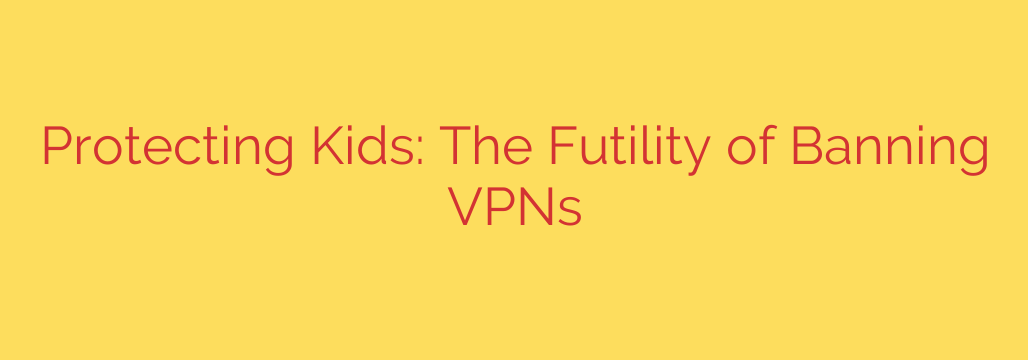
Protecting Kids Online: Why Banning VPNs is the Wrong Strategy
In the ongoing mission to keep children safe online, parents, schools, and even governments are constantly searching for effective solutions. From sophisticated content filters to strict screen time limits, the toolkit for digital parenting is always expanding. Recently, a new target has entered the crosshairs: the Virtual Private Network, or VPN. The logic seems simple—if kids use VPNs to bypass safety controls, then banning VPNs should make them safer.
Unfortunately, this approach is not only ineffective but also dangerously shortsighted. Targeting the tool instead of the behavior misses the bigger picture and can leave children less secure in the long run.
What is a VPN, and Why Do People Use Them?
Before we explore why a ban is a flawed idea, it’s important to understand what a VPN actually does. A VPN creates a secure, encrypted connection—like a private tunnel—between a user’s device and the internet. This tunnel hides the user’s online activity from their Internet Service Provider (ISP), network administrators (like at a school or public library), and other third parties.
While some kids might use them to access blocked games or social media, VPNs serve several critical, legitimate purposes:
- Data Security: On public Wi-Fi networks (like those in cafes, airports, or hotels), VPNs encrypt your data, protecting you from hackers who might try to steal passwords or financial information.
- Privacy Protection: VPNs prevent your ISP and advertisers from tracking every website you visit, giving you a greater degree of online privacy.
- Bypassing Censorship: For people living under oppressive regimes, VPNs are an essential tool for accessing uncensored news, information, and communication platforms.
The Futility of a Technical Arms Race
Attempting to block VPNs to enforce parental or school controls is like playing a game of whack-a-mole that you are destined to lose. Here’s why a ban is a futile effort:
- There are countless alternatives. A VPN is just one of many ways to bypass network restrictions. Tech-savvy teens can easily find and use web proxies, the Tor browser, custom DNS settings, or even mobile hotspots to get around a filter. Focusing on VPNs alone ignores a vast ecosystem of circumvention tools.
- Enforcement is nearly impossible. There are thousands of VPN providers, with new ones appearing daily. Many are specifically designed to be “stealthy” and evade detection. Blocking them all is a technical nightmare that requires constant, exhaustive effort.
- It punishes responsible users. By banning VPNs, you strip away a powerful security tool from everyone, including students and children who may be using it responsibly. A student using school Wi-Fi is arguably safer with a VPN protecting their data from potential threats on the network.
The Real Solution: Shifting from Prohibition to Preparation
The desire to bypass a filter isn’t a technical problem; it’s a behavioral one. A child trying to get around a restriction is a sign that a conversation is needed, not a stricter lockdown. Instead of building higher digital walls, we should focus on giving our children the skills to navigate the online world safely and responsibly.
Here are actionable steps that make a real difference:
- Prioritize Open Communication. The most effective safety tool is an open dialogue. Talk to your children about why certain rules are in place. Explain the real dangers of the internet, such as online predators, scams, and exposure to inappropriate content. When kids understand the “why,” they are more likely to respect the boundaries.
- Build a Foundation of Trust. Create an environment where your child feels comfortable coming to you if they see something that makes them uncomfortable or if they make a mistake online. Punitive reactions to honest mistakes can drive them to hide their activities, making it much harder to keep them safe.
- Teach Digital Literacy and Critical Thinking. Empower your children to be savvy digital citizens. Teach them how to identify misinformation, recognize phishing attempts, and understand the importance of data privacy. A child who can spot danger on their own is infinitely safer than one who is simply blocked from it.
- Use Layered Controls as a Guide, Not a Guarantee. Parental controls and filters have their place, especially for younger children. However, they should be seen as a supportive measure within a broader strategy of education and communication, not as a foolproof solution.
Ultimately, the goal is not to block every potential path to trouble but to raise children who are resilient, informed, and prepared to make smart choices on their own. Banning a security tool like a VPN is a step in the wrong direction—it offers a false sense of security while undermining the very principles of privacy and education that truly keep our kids safe.
Source: https://go.theregister.com/feed/www.theregister.com/2025/07/31/banning_vpns_to_protect_kids/








